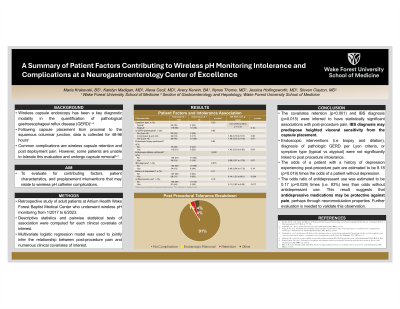Monday Poster Session
Category: Esophagus
P2222 - Wireless pH Intolerance and Complications: Insights From a Neurogastroenterology Center of Excellence
Monday, October 28, 2024
10:30 AM - 4:00 PM ET
Location: Exhibit Hall E

Has Audio

Maria Krakovski, BS
Wake Forest University School of Medicine
Winston-Salem, NC
Presenting Author(s)
Maria Krakovski, BS1, Katelyn Madigan, MD2, Alexa Cecil, MD, MPH2, Avery Kerwin, BA1, Steven Clayton, MD1, Nyree Thorne, MD2, Jessica W. Hollingsworth, MD2
1Wake Forest University School of Medicine, Winston-Salem, NC; 2Atrium Health Wake Forest Baptist, Winston-Salem, NC
Introduction: Wireless capsule endoscopy has been a key diagnostic modality in quantifying pathological GERD. Following capsule placement 6cm proximal to the squamous columnar junction, pH data is collected for 48-96 hours. Common complications are wireless capsule retention and post-deployment pain. Our study aims to evaluate contributing factors, patient characteristics, and pre-placement interventions that may relate to wireless pH capsule complications.
Methods: This retrospective study analyzed adult gastroenterology patients at Atrium Health Wake Forest Baptist Medical Center [Winston-Salem, North Carolina] who underwent wireless pH monitoring from January 2017 to June 2023. Descriptive statistics and pairwise statistical tests of association were calculated for each clinical covariate. Additionally, a multivariate logistic regression model was utilized to examine the relationship between post-procedure pain and various clinical covariates.
Results: Among the 206 participants who underwent wireless pH capsule placement, 18 (8.73%) experienced post-procedural intolerance. Two of those cases were severe enough to require endoscopic removal before the 96-hour monitoring was complete. Additionally, seven patients had capsule retention lasting 4-14 days. Significant associations were found between post-procedural pain and both capsule retention (p< 0.001) and irritable bowel syndrome (IBS) diagnosis (p=0.015). As demonstrated in Table 1, patients with depression had 8.18 times higher odds of experiencing post-procedural pain/intolerance (95% CI: 1.53, 53.5; p=0.019), whereas antidepressant use was associated with a significant reduction in odds for post-procedural intolerance (95% CI: 0.03, 0.77; p=0.029). Alternative diagnoses such as anxiety or fibromyalgia, endoscopic interventions, pathologic gastroesophageal reflux disease diagnosis [per Lyon Consensus 2.0], and symptom type were not significantly linked to post-procedure intolerance.
Discussion: Both IBS and depression were linked to post-procedural intolerance, while post-procedural intolerance was associated with esophageal capsule retention. Notably, anti-depressant use appeared protective, potentially due to their neuromodulating properties. Further studies are needed to confirm these findings.
Note: The table for this abstract can be viewed in the ePoster Gallery section of the ACG 2024 ePoster Site or in The American Journal of Gastroenterology's abstract supplement issue, both of which will be available starting October 27, 2024.
Disclosures:
Maria Krakovski, BS1, Katelyn Madigan, MD2, Alexa Cecil, MD, MPH2, Avery Kerwin, BA1, Steven Clayton, MD1, Nyree Thorne, MD2, Jessica W. Hollingsworth, MD2. P2222 - Wireless pH Intolerance and Complications: Insights From a Neurogastroenterology Center of Excellence, ACG 2024 Annual Scientific Meeting Abstracts. Philadelphia, PA: American College of Gastroenterology.
1Wake Forest University School of Medicine, Winston-Salem, NC; 2Atrium Health Wake Forest Baptist, Winston-Salem, NC
Introduction: Wireless capsule endoscopy has been a key diagnostic modality in quantifying pathological GERD. Following capsule placement 6cm proximal to the squamous columnar junction, pH data is collected for 48-96 hours. Common complications are wireless capsule retention and post-deployment pain. Our study aims to evaluate contributing factors, patient characteristics, and pre-placement interventions that may relate to wireless pH capsule complications.
Methods: This retrospective study analyzed adult gastroenterology patients at Atrium Health Wake Forest Baptist Medical Center [Winston-Salem, North Carolina] who underwent wireless pH monitoring from January 2017 to June 2023. Descriptive statistics and pairwise statistical tests of association were calculated for each clinical covariate. Additionally, a multivariate logistic regression model was utilized to examine the relationship between post-procedure pain and various clinical covariates.
Results: Among the 206 participants who underwent wireless pH capsule placement, 18 (8.73%) experienced post-procedural intolerance. Two of those cases were severe enough to require endoscopic removal before the 96-hour monitoring was complete. Additionally, seven patients had capsule retention lasting 4-14 days. Significant associations were found between post-procedural pain and both capsule retention (p< 0.001) and irritable bowel syndrome (IBS) diagnosis (p=0.015). As demonstrated in Table 1, patients with depression had 8.18 times higher odds of experiencing post-procedural pain/intolerance (95% CI: 1.53, 53.5; p=0.019), whereas antidepressant use was associated with a significant reduction in odds for post-procedural intolerance (95% CI: 0.03, 0.77; p=0.029). Alternative diagnoses such as anxiety or fibromyalgia, endoscopic interventions, pathologic gastroesophageal reflux disease diagnosis [per Lyon Consensus 2.0], and symptom type were not significantly linked to post-procedure intolerance.
Discussion: Both IBS and depression were linked to post-procedural intolerance, while post-procedural intolerance was associated with esophageal capsule retention. Notably, anti-depressant use appeared protective, potentially due to their neuromodulating properties. Further studies are needed to confirm these findings.
Note: The table for this abstract can be viewed in the ePoster Gallery section of the ACG 2024 ePoster Site or in The American Journal of Gastroenterology's abstract supplement issue, both of which will be available starting October 27, 2024.
Disclosures:
Maria Krakovski indicated no relevant financial relationships.
Katelyn Madigan indicated no relevant financial relationships.
Alexa Cecil indicated no relevant financial relationships.
Avery Kerwin indicated no relevant financial relationships.
Steven Clayton indicated no relevant financial relationships.
Nyree Thorne: Medtronic – Consultant.
Jessica Hollingsworth indicated no relevant financial relationships.
Maria Krakovski, BS1, Katelyn Madigan, MD2, Alexa Cecil, MD, MPH2, Avery Kerwin, BA1, Steven Clayton, MD1, Nyree Thorne, MD2, Jessica W. Hollingsworth, MD2. P2222 - Wireless pH Intolerance and Complications: Insights From a Neurogastroenterology Center of Excellence, ACG 2024 Annual Scientific Meeting Abstracts. Philadelphia, PA: American College of Gastroenterology.
